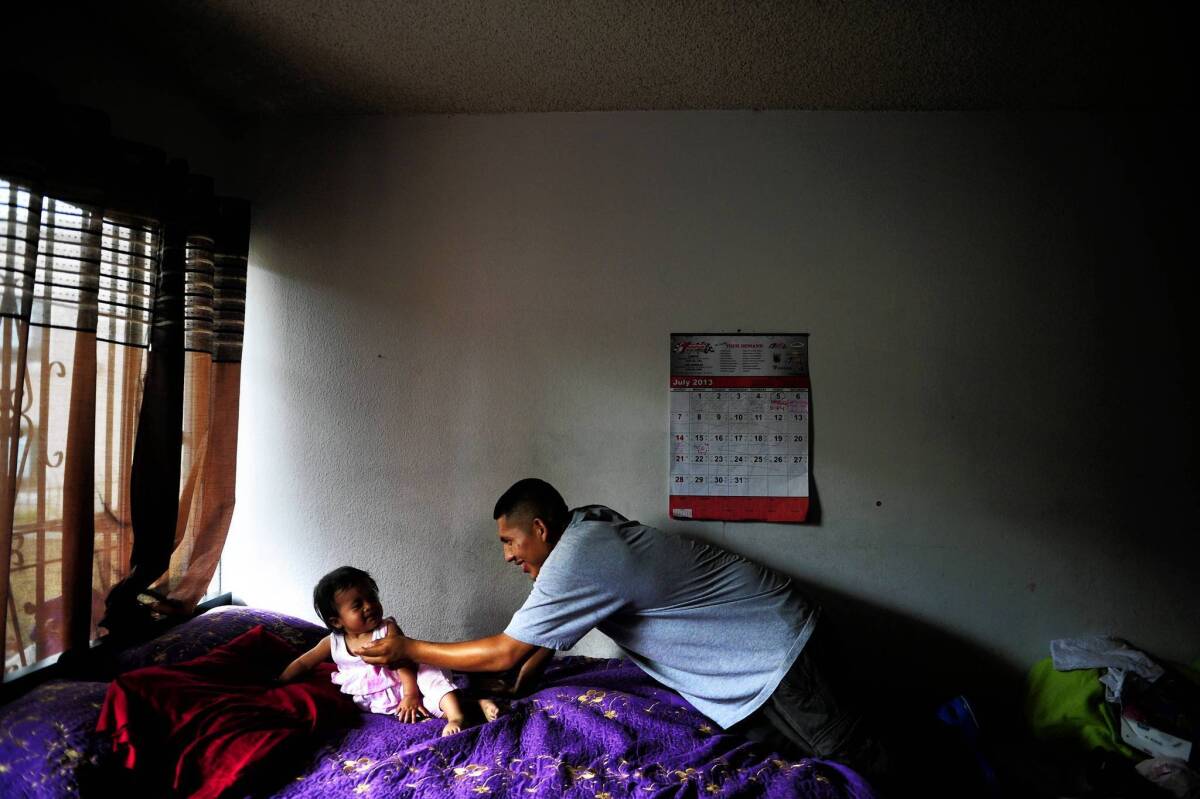Children’s Hospital L.A. program reaches out to teen dads

- Share via
Frank Mariano walked up the block and made a right turn toward a group of carefree teenage boys who spent the muggy summer day in Koreatown skateboarding and checking their phones for text messages.
Frank approached the youths — who eyed him with puzzled looks — but then the 16-year-old pushed a stroller into the playground where he would spend the afternoon with Anabell, his 1-year-old daughter.
Frank would later leave the toddler with her 17-year-old mother and head to Children’s Hospital Los Angeles to meet with two dozen other fathers — between the ages of 14 and 25 — to discuss their shared struggles and to learn skills to help ease their lives.
The L.A. Fathers Program at the hospital is designed to reach the often forgotten partner in teen pregnancies and dispel the stereotypes attached to the young men — deadbeat, irresponsible or absent fathers.
The voluntary program scours some of the poorest neighborhoods in Los Angeles to find young fathers and provide them with free parenting and relationship classes, job placement and social services. In about a year, they’ve had nearly 250 teen fathers go through the program. They receive free food, diapers and condoms for attending.
It has developed into a haven where the young men feel safe to relax and talk about the challenges they each face — and sometimes to vent about their “baby mama,” if needed.
“A lot of young dads feel alienated and experience a lot of judgment — from their family, from their friends, at school,” said Frank Blaney, the program’s coordinator. “Here, there are other dads that are going through the same experience they are.”
The program, which began last summer, aims to help the young men learn the skills to become responsible parents and be active in their children’s lives. The hospital has long had a similar program for teenage mothers, and hospital officials recognized a need to reach young fathers as well.
The program includes 10 weekly classes on job skills training and nonviolent parenting and relationship classes. Program coordinators find the youths by reaching out to social workers, school counselors, and mental health and probation offices. This year, they launched an ad campaign on buses and trains around the city.
During a recent class, Blaney asked participants to raise their hand if they grew up without a father figure; nearly all raised their hands.
He then asked what they were taught about what it means to be a man. “Have a lot of women,” said one. “Men don’t cry,” said another. “Control your woman,” someone said. Blaney explained that those are the prevailing stereotypes — but men can be sensitive, loving, caring and still be a man.
Then one shouted: “Provide for your family!”
“That’s right. There’s the player — then there’s the man who is at home holding it down for his family,” Blaney replied. “We can pick the path we want to take as men.”
The pressure to immediately be providers, however, can be detrimental in the long term, Blaney said. Often, teenage fathers immediately drop out of school to get whatever work they can because they feel that a man should be the breadwinner. They frequently get stuck in low-paying, low-skilled jobs as a result. “It becomes a dead-end trap,” Blaney said.
The program stresses finishing high school and continuing their education if possible — stressing the higher earning potential — and helps them find jobs that can accommodate both.
“It’s very difficult for most of these guys to have a long-term viewpoint,” Blaney said. “They have such immediate needs.”
The program is funded by a three-year, $784,500 grant from the U.S. Office of Family Assistance. For the funding to be renewed, officials must demonstrate that they have been effective in getting participants jobs. Blaney has been reaching out to local employers to explain that the program involves young, highly motivated men who are looking for work. “It’s basically, ‘Please — give our dads a chance,’” he said.
Frank Mariano has been able to balance school and work. He continues to go to high school and works in construction on days off. He hopes to attend culinary school after graduation and become a chef. His girlfriend, the mother of his child, recently graduated from high school and will attend junior college in the fall.
“I put school before work,” Frank said. “Without my education I won’t be able to complete my goals.”
The class also saved his relationship, he said. In 2011, Frank said, he was arrested on suspicion of domestic battery after a fight with his girlfriend. He was put on probation.
They argued often and lacked communication. It was a session with Ben Wright, who conducts the parenting courses, that marked a change.
Wright brought out two animal hand puppets — which always draws skeptical laughter from the guys — each representing separate approaches to parenting and relationships. The jackal represents an aggressive, angry form of communication rife with criticism, judgment and blame. The other puppet, a giraffe, represents cooperation and understanding. The giraffe’s heart, Wright explains, is large because it must pump blood all the way up its neck to the brain.
The fathers act out situations with each — demonstrating the hurtful and long-lasting effects the jackal can have on their children and their partners. “When I saw him take out the puppets I was like ‘What the hell?’ ” Frank said. “But after — he had a point.”
He added: “I’m more giraffe than jackal now.”
More to Read
Sign up for Essential California
The most important California stories and recommendations in your inbox every morning.
You may occasionally receive promotional content from the Los Angeles Times.














